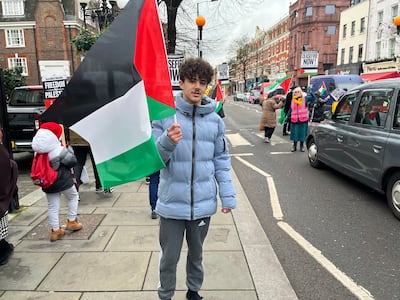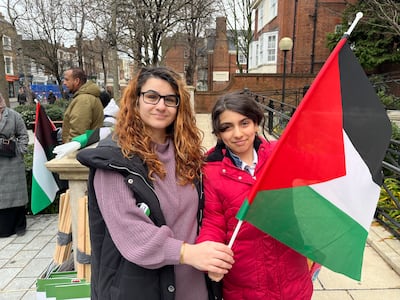Live updates: Follow the latest news on Israel-Gaza
When the war in Ukraine broke out, 14-year-old Zino Masoud's north London school held an assembly about the conflict.
When the Israel-Gaza war started, he assumed that it would similarly be discussed. But not so.
“It’s weird because for Ukraine, it's OK to discuss the problem, but for this, you have to stay neutral,” he told The National during a 'school strike' when thousands of youngsters took part in demonstrations across the UK this week, which organisers said was an opportunity for young people, as well as adults, to voice their concern about the death toll from the fighting.
Zino's experience of what he believes is double standards highlights the tension that exists in schools in the UK as they wrestle with the sensitivities of how to handle the war, which has so far killed more than 27,700 Palestinians, with many more displaced from their homes.
Former teacher Michael Davies told The National that requests for teaching material about the conflict had tripled since the war began following the October 7 Hamas attacks.
His organisation, Parallel Histories, has devised methods to teach the conflict sensitively, giving parallel accounts of events from both the Israeli and the Palestinian perspectives.
“We’ve had a 300 per cent increase in requests for material compared to the same time last year,” he said.
This included requests from schools across the UK and in other countries such as New Zealand and Australia, where uptake had been low in the past.
The Israel-Palestine conflict is taught as an optional module for GCSE in UK schools, but teachers are often hesitant to pick it up.
Teaching conflict is fraught with challenges, not least because of the backlash from pupils who may feel that one side has been given more credence than the other.

The most challenging part of teaching the conflict’s history, Mr Davies said, is that both sides want their grievances recognised.
“It all boils down to who is the victim. It’s as simple as that,” he said.
As long as this was acknowledged, then both sides were less likely to contest a narrative they did not agree with, he said.
“Even though Israel has been victorious since 1948, but particularly since 1967, they still have, as part of their national identity, clung on to the idea of victimhood,” he said, citing an Israeli historian.
Jewish schools and Muslim majority schools had previously come together to discuss the conflict in workshops organised by Parallel Histories, he said, although now this could be more challenging.
Some Jewish schools that Mr Davies had worked with in the past were hesitant to continue after the October 7 Hamas attack, in which 1,200 people in Israel – most of them civilians – were killed.
Instead, some had started teaching the Northern Ireland conflict, another hotly contested history from which parallels can be drawn, Mr Davies said.
In January, two independent Jewish schools and a grammar school in London met for a workshop about Ireland’s Great Famine, Ireland’s partition and the legacy of Margaret Thatcher, a divisive figure in British politics.
“Both have used history to justify their own political demands and infuse their followers with a sense of their own righteousness. With the sense that people who disagree with them are bad people,” he said.

Parents taking part in the school strike, organised by the Stop the War Coalition, one of the five groups behind the pro-Palestine marches in central London and other cities, also question why the issue of Gaza is not being discussed.
Rosie Naz, a mother of two, was with one of her daughters, Elfida, 10, who she says is “someone who loves writing poems and literature”.
“The teachers gave her homework which was to write a poem, and she wrote one about Palestine but they told her that’s irrelevant,” she told The National.
“I don’t blame the teacher because he’s probably trying not to cause problems but as the school itself, they should be all-inclusive.
“We’re supposed to be a diverse country and a diverse school but for some reason when it comes to Palestine, they just don’t talk about it.
“We’ve even told the kids to try not to talk about it at school because it’s seen as a political issue.”
She also contrasts how her children's school dealt with Ukraine when the country's flags were displayed in solidarity and fund-raisers held, to Gaza.

“Our children should be allowed to express their emotions when it comes to things they see,” she said.
“They’ve seen the ruins and they’ve seen children crying. I do talk about it because they need to know. If they are taught about what’s happening in Ukraine, why shouldn’t they be taught about what’s happening in the Middle East?”
The strike saw schoolchildren read out messages in support of the Palestinians in London.
Children and their parents first gathered in Islington, then marched to the constituency office of local Labour MP Emily Thornberry, to voice their anger over her decision to oppose a call for a ceasefire in a vote in the UK Parliament.
Later, they gathered in Parliament Square, where children read out messages of support for Palestinians in Gaza.
“We demand a ceasefire in Gaza and the Palestinians have their rights. It makes me sad seeing all these children suffer and die,” said Ayra Nezam, eight.
Zeina Saleh, who helped organise the event, said she was doing it so her daughter could live in a country “where her Palestinian identity can be protected, that she can express herself as a Palestinian in a safe environment”.
